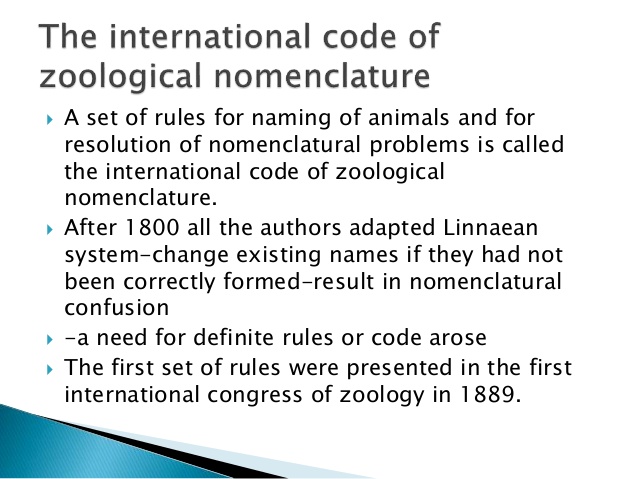Zoological Nomenclature – Zoology Notes – For W.B.C.S. Examination.
প্রাণিবিদ্যার নামকরণের পধ্যতি বা পরিভাশা – প্রাণিবিদ্যা নোট – WBCS পরীক্ষা।
The International Commission on Zoological Nomenclature (ICZN) acts as adviser and arbiter for the zoological community by generating and disseminating information on the correct use of the scientific names of animals. The ICZN is responsible for producing the International Code of Zoological Nomenclature – a set of rules for the naming of animals and the resolution of nomenclature.Continue Reading Zoological Nomenclature – Zoology Notes – For W.B.C.S. Examination.
Nomenclature provides names to species and higher taxa, to facilitate communication among zoologists. According to Article 1 of the code:
“Zoological nomenclature is the system of scientific names applied to taxonomic units of animals (taxa) known to occur in nature, whether living or extinct.” The nomenclature should fulfill the following three basic requirements:
Uniqueness: The name of a taxon is like the index number of a file. It gives immediate access to all information in literature, available about a particular taxon. Every name must be unique because it is key to the entire literature. Uniqueness has been achieved by adopting binominal nomenclature, as proposed by Linnaeus in the X edition of Systema Naturae in 1758.
According to binominal nomenclature, each species name should consist of the first generic and second species name. Species name should not duplicate under any genus, e.g. Panthera leo, Panthera tigris, Panthera pardus. A combination of the two makes the name unique.
Universality: Scientific names should be known to all and be universally accepted. Vernacular names would be difficult to keep track of, and scientists will have to learn names in several languages of the world. To avoid this, zoologists have adopted by international agreement a single language, Latin, which is a dead language and therefore does not evolve and is acceptable to everybody.
One need not learn Latin language in order to give name. Any word in any language, if latinized by changing the ending by suffixing –us,-a, or –ensis is acceptable as valid Latin name, e.g., japonica, indicus, chinensis. Use of Latin is also advantageous due to the fact that most of the ancient scientific literature is written either in Latin or Greek and it would be easy to refer to the old literature if names are given in Latin.
Stability: Zoological names would lose their utility if they were changed frequently and arbitrarily. It would create confusion if we call an object spoon today and apple next week. International Code of Zoological Nomenclature has been designed to bring about stability. Taxonomists are bound to follow the rules given in the code before assigning names to taxa. Most of the changes in names are due to taxonomists’ errors. Lot of name changing has taken place during the last 200 years. International Code of Zoological Nomenclature safeguards against frequent name changing.
Please subscribe here to get all future updates on this post/page/category/website


 Toll Free 1800 572 9282
Toll Free 1800 572 9282  mailus@wbcsmadeeasy.in
mailus@wbcsmadeeasy.in



















































































































